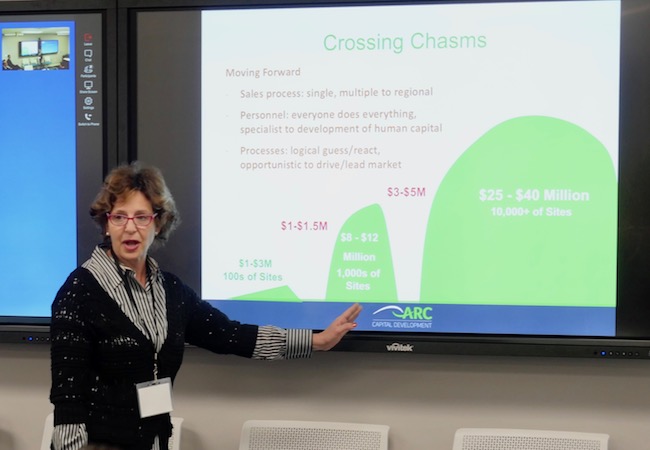Catalyst boot camp introduces entrepreneurs to the business of education
The eyes of more than 50 education entrepreneurs followed Rita Ferrandino as she led them through the rolling waves of a chart representing the business calendar used by American schools and universities.
If you can master this cycle, Ferrandino told the entrepreneurs, your concept could break through and change how children learn. If you can't, your concept will be another good idea that failed to reach students, because it failed as a business.

The entrepreneurs came from seven states on for "Selling into the US Education Marketplace," the second one-day boot camp from Catalyst@Penn GSE. Most were in the earliest stages of developing their first education business or nonprofit. The boot camp was designed to introduce them to the fundamentals of working in a sector that has a distinct structure governed by both standards and customs.
Catalyst is Penn GSE's new endeavor to spark ideas and ventures, provide training for leaders and professionals, and connect diverse constituencies to solve persistent and emerging problems in education. Throughout its work, Catalyst combines education, business, and technology to embrace an ongoing process of generating, testing, adapting, modeling, and disseminating best practices.
Catalyst boot camps and other workshops will support the efforts of entrepreneurs, investors, educators, researchers, and business leaders to introduce new solutions in education into the marketplace.
"Starting a new venture is super difficult, risky and often lonely. By providing expert insights and industry connections, education entrepreneurs who participate in our boot camps don’t have to go it alone. They gain an understanding of the complex educational systems, build skills and knowledge to enhance their plans and develop relationships with industry veterans," said Catalyst@PennGSE Executive Director Michael Golden.
The first obstacle for many of the entrepreneurs attending the February 26 boot camp was developing a sustainable business plan. That, Ferrandino told them, starts by matching your businesses timetable to those used by school district's business administrators.
"In the US, we have a sales process, and everything revolves around it, from your product development and launch, to your marketing, to your fundraising," said Ferrandino, Catalyst@Penn GSE's entrepreneurship and incubation advisor.
Mitch Weisburgh, Managing Partner of Academic Business Advisors, gave an introduction to education sales, and how it can differ from other industries. Later, a panel of seasoned education entrepreneurs offered examples of decisions that changed the course of their businesses.
Kurt Allen, the Director of Sales at CodeMonkey Studios, said the boot camp reinforced the idea that in education you aren't selling a product, but a solution. After the boot camp, he had a game plan for bringing CodeMonkey's introductory coding classes into more schools.
"I'm going to leave here and look at more district's strategic plans," Allen said. "If computer science is part of that plan, and I'm not talking to them, I should be. And I know what I'm going to say. Information like that has been extremely valuable."
Nikil Ragav, is a Penn sophomore and CEO of inventorspacexyz, a business looking to expand from hosting 24-hour inventathons for middle and high school-students to designing and installing inventorspaces in schools.
"This session was extremely helpful in learning who to target, what an education sales strategy looks like, what the sales cycle in education is," Ragav said.
Catalyst will continue to offer boot camps covering an array of topics that often stumbling blocks for education entreprenuers. Previously, it hosted “Exploring the EdTech Funding Landscape.”
On April 9, Catalyst will host its next boot camp, which will help entrepreneurs incorporate the latest education research into their businesses.
